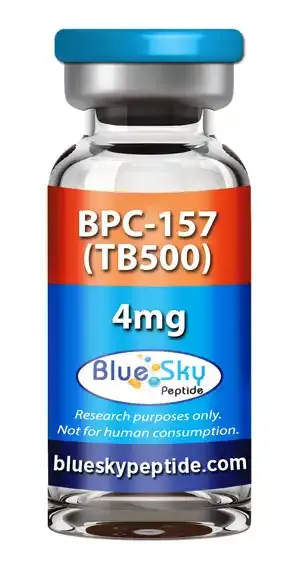45% Off Everything*
Save Now!!

Availability: In stock

| Unit Size | 4 mg/vial |
| Unit Quantity | 1 vial |
| Purity (Mass Spectrometry and UV) | 99.91% |
| Sequence (BPC-157) | H-Gly-Glu-Pro-Pro-Pro-Gly-Lys-Pro-Ala-Asp-Asp-Ala-Gly-Leu-Val-OH |
| Sequence (TB500) | Ac-Ser-Asp-Lys-Pro-Asp-Met-Ala-Glu-Ile-Glu-Lys-Phe-Asp-Lys-Ser-Lys-Leu-Lys-Lys-Thr-Glu-Thr-Gln-Glu-Lys-Asn-Pro-Leu-Pro-Ser-Lys-Glu-Thr-Ile-Glu-Gln-Glu-Lys- Gln-Ala-Gly-Glu-Ser-OH |
| Molecular Formula (BPC-157) | C62H98N16O78 |
| Molecular Formula (TB500) | C212H350N56O22 S |
| Appearance | Lyophilized White Powder |
| Source | Chemical Synthesis |
| Storage | Lyophilized Blend BPC-157 2MG with Thymosin Beta 4 (TB500) 2MG is Stable at roomTemperature for 90 days, however it is best to store in a freezer below - 8c for any extended period of time. . |
| Terms | The products we offer are intended for laboratory research use only. Please familiarize yourself with our terms of service prior to ordering. |
Blend BPC-157 2MG with Thymosin Beta 4 (TB500) 2MG is a synergistic combination of two synthetic peptides formulated specifically for in vitro laboratory research. These peptides are strictly intended for research purposes only and are not approved for human or animal consumption. All usage should be conducted in controlled laboratory settings under strict experimental protocols.
Both BPC-157 and Thymosin Beta 4 have been explored in preclinical studies for their potential in wound healing, tissue repair, and regenerative research. Animal studies on BPC-157 and Thymosin Beta 4 have investigated their roles in:
It’s essential to recognize that these studies are preliminary and do not confirm clinical efficacy.
BPC-157 has demonstrated various mechanisms of action in laboratory settings, including:
These properties make BPC-157 an intriguing peptide for in vitro studies on tissue healing and cellular regeneration.
Thymosin Beta 4 binds to actin, a protein essential for cellular movement, and supports the migration and differentiation of stem and progenitor cells. Its role in promoting new blood vessel formation and tissue regeneration makes it a valuable asset in cell biology research.9
While both BPC-157 and Thymosin Beta 4 exhibit individual benefits, their combined effects have been minimally studied. One exploratory study reported that 75% of subjects receiving both peptides showed improvement in knee pain.10 However, this study's small sample size and lack of a control group mean these findings are inconclusive and should be regarded as preliminary.
This peptide blend is provided strictly for in vitro laboratory research and is not suitable for clinical, veterinary, or personal use. Application or ingestion outside of controlled research settings may pose significant risks and is prohibited.
The blend is supplied as a white lyophilized powder, with each vial containing a total of 10 mg (2 mg of each peptide).
References